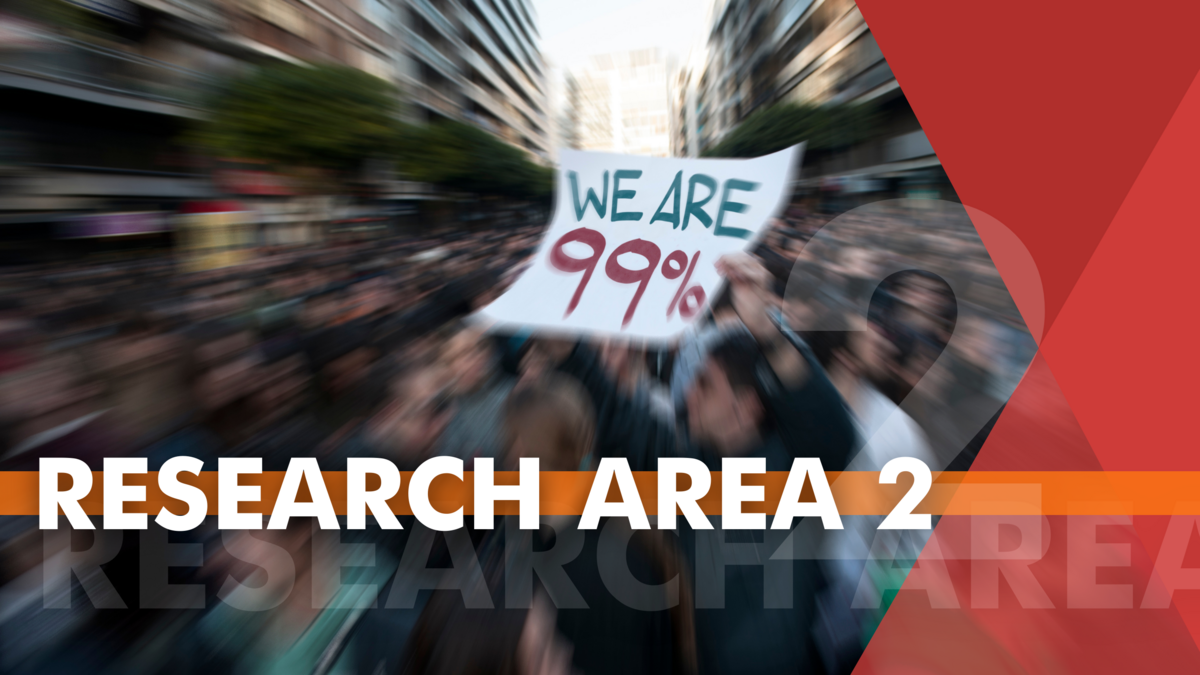RA2 combines social, cultural, and political science as well as historical research on the reasons, mechanisms and legitimisation strategies for cohesion within and between societies. It focuses on the formation of those actors that emerge as a reaction to new global dynamics. Special attention is currently being paid to the (right-wing) populist challenge to a liberal order in conflict with the formation of a transnationally organised cosmopolitanism and nationalist forces.
RA 2 focuses on the historical transformation of the reasons, mechanisms and legitimisation strategies for cohesion at the level of individual societies and in cross-border configurations, as well as the formation of those political actors that emerge in response to new global dynamics. Particular attention is paid to the (right-wing) populist challenge to a liberal order on the one hand and the formation of a transnationally organised cosmopolitanism and the resulting renegotiation of concepts of sovereignty under conditions of globalisation on the other. These conflicts have profound consequences for the dialectics of cohesion and individualisation in contemporary societies, which are reflected in new cleavages and new fragmentations, but also give rise to new debates on racism and the postcolonial condition, which are examined empirically in an international comparison.
RA 2 analyses the connection between inclusion or exclusion in individual societies and changes in global inequalities on the one hand and processes of solidarisation or desolidarisation or exclusive solidarisation at a historical moment in which demands for the formation of a global agency to meet the challenge of the Anthropocene are becoming louder.
An important part of RA2 is the Leipzig branch of the Research Institute Social Cohesion (RISC), in which social, cultural, regional and historic approaches are combined, in order to receive insight on the changing foundations of social cohesion in regional, national, european and global comparison. Attached to the research of RISC is a nation-wide large-scal study on racism in German institutions (InRa), which is also represented in RA2 by multiple research projects. The Else-Frenkel-Brunswik-Institute puts a regional focus by documenting anti-democratic attitudes, structures and endeavors in Saxony and, building on this expertise, advising civil society and policy makers. With the Jean Monnet Centre of Excellece, RA2 takes into account to the European Union and its rural periphery in Eastern Central Europe, where the centre conducts interdisciplinary and comparative analyses on attitudes, practices and potentials of EU-citizenship
Research Networks and Projects
The Research Institute Social Cohesion (RISC) is an institute funded by the federal ministry of education and research (BMBF) since 2020. With branches located in ten different federal states, it is able to also fucus on the regional variability of social cohesion in Germany. At the location in Leipzig, an interdisciplinary team of about 20 researchers in 14 projects examines the plurality of populist movements and regimes as well as their acceptance in populations since the late 19th century until the present.
The InRa-Study is a research alliance funded by the Federal Ministry of the Interior and Community (BMI) and attached to the Research Institute Social Cohesion (RISC). At eight locations and in 23 sub-projects, it explores racism in German institutions. The main coordinating branch is located in Leipzig. The researchers examine different understandings of racism and their historical transmission as well as how racism concretelely manifests in the actions of institutions.
The Else-Frenkel-Brunswik-Institute (EFBI) is a documentation and research centre for the analysis and evaluation of antidemocratic and minsanthropic tendencies in Saxony. It forms a research infrastructure in Saxony that identifies research desiderata on anti-democratic attitudes, structures and endeavours on the basis of scientific findings and methods and closes these gaps in knowledge through documentation and investigations. The focus is on various forms of discrimination, the strategies and dynamics of right-wing authoritarian alliances and the strengthening of democratic politics. The EFBI has been funded by the state of Saxony since 2020.
Jean Monnet Centre of Excellence "Die Europäische Union und ihre ländliche Peripherie in Ostmitteleuropa"
Das Jean Monnet Centre of Excellence (JMCoE) "Die Europäische Union und ihre ländliche Peripherie in Ostmitteleuropa" soll die Beteiligung am demokratischen Leben in der EU und eine aktive Unionsbürgerschaft fördern. Das Zentrum trägt dazu bei, Lücken der EU-Forschung zu füllen, indem es die Einstellungen, Praktiken und Potenziale der EU-Bürgerschaft in der Peripherie interdisziplinär analysiert und dabei neue Methoden, Instrumente und Ansätze nutzt. Es setzt mit einem Fokus auf jungen Menschen bei der Gesellschaft auf der lokalen und regionalen Ebene in ländlichen Räumen Ostmitteleuropas an. Das JMCoE wird seit 2020 von der Europäischen Union gefördert.



